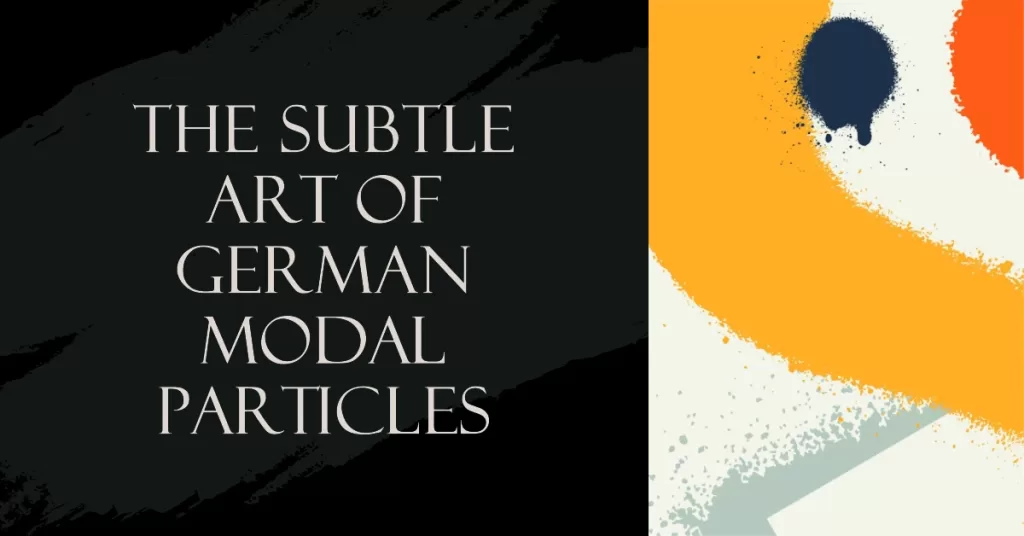
Imagine German conversation as an intricate dance, where words and phrases gracefully intertwine to create a harmonious flow.
Amidst this dance, there’s a group of tiny elements that subtly change the vibe, adding color and nuance. These are the German modal particles, inconspicuous little words that have the power to lightly shift or completely transform what’s being said.
These delicate, seemingly inconsequential words imbue the conversation with emotion and fluidity, elevating German dialogue to an everyday art form. And they’re not even that rare. Once you’ve spotted them for the first time, you’ll suddenly see them everywhere!
In this article, we will dive into the bewildering world of German modal particles, exploring their role in conversational German and how they can bring life and emotion to any discussion.
The Magic of Modal Particles
Some common examples of modal particles include “doch,” “ja,” “schon,” “eben,” and “halt.” While they don’t have a direct translation in English, they play a vital role in conveying the speaker’s attitude, mood, or intention.
So how do they work exactly?
Well, it’s not that easy, because each modal particle can mean completely different things, depending on their context.
Let’s delve deeper into the enigma of these linguistic chameleons and unravel their shapeshifting magic step by step.

Unraveling the Mystery: Modal Particles in Context
Just like a chameleon changes its colors to match its environment, modal particles adapt their meaning based on the surrounding words and phrases.
This fluidity allows them to convey an array of emotions, from surprise and annoyance to reassurance and emphasis.
For instance, consider the modal particle “doch.” In one context, it can be used to contradict a negative statement:
Du bist nicht hungrig. (You’re not hungry.)
Doch, ich habe Hunger! (Yes, I am hungry!)
In another situation, “doch” can convey reassurance:
Mach dir keine Sorgen, ich finde den Weg doch.
(Don’t worry, I’ll find the way after all.)
The same modal particle can also be used to soften a request:
Gib mir doch bitte mal das Salz!
(Please do hand over the salt to me, please!)
As you can see, the same modal particle can take on completely different meanings.
This adaptability is what makes modal particles so intriguing and essential to mastering conversational German.
Taking a look at the following table with various usages for each modal particle you’ll note the wildly different effects each one can have on an utterance:
| Modal Particle | Usage |
|---|---|
| doch | Contradict a negative statement, express reassurance, soften a request |
| ja | Emphasize a point, soften a request, express agreement or surprise |
| schon | Concede a point, soften criticism, imply a limitation, express reassurance |
| eben | Express resignation, justify a statement or decision, emphasize inevitability |
| halt | Express resignation, provide a reason for a statement or decision, emphasize a fact |
| mal | Soften a request, express a suggestion, indicate a possibility |
| auch | Express agreement, emphasize a point, indicate the similarity of two situations |
| nun | Indicate a change of subject, express impatience or frustration, seek clarification |
| einfach | Express simplicity, emphasize a fact, express frustration |
| wirklich | Emphasize a statement, express doubt or disbelief, question sincerity |
| vielleicht | Indicate uncertainty or possibility, soften a statement, express a suggestion |
| ziemlich | Express a degree of intensity or extent, emphasize a statement, convey approximation |
| eigentlich | Express an expectation, introduce a new perspective, soften a question or statement |
| natürlich | Express agreement, emphasize a fact, convey sarcasm |
| sicher | Express certainty, agreement, or sarcasm, emphasize a point |
| bestimmt | Express certainty, emphasize a point, convey a high degree of probability |
| sowieso | Express inevitability, emphasize a fact, convey that something is true regardless of other circumstances |
Please note that his not an exhaustive list, but just a brief introduction.
The Conversational Dance: Modal Particles and Tone
One of the most important functions of German modal particles is their ability to shape the tone of a conversation. They act as the conductor, guiding the flow of dialogue with subtle shifts in tempo and mood.
Modal particles can soften the edges of a statement, emphasize a point, or even add a touch of sarcasm or politeness.
For example, “einfach” can be used to emphasize a point, as in:
Sie hat das einfach gemacht!
(She just went ahead and did it!)
On the other hand, “einfach” can also convey the speaker’s exasperation or irritation about a situation. Here’s an example:
Warum passiert mir das einfach immer?
(Why does this always just happen to me?)
Modal particles are also frequently used in common idiomatic expressions, imbuing them with a unique sense of character and emotion:
- Na ja (with “ja” as a modal particle)
Meaning: Well, so-so, it depends - Mach mal halblang! (with “mal” as a modal particle)
Meaning: Take it down a notch, don’t exaggerate - Nicht doch! (with “doch” as a modal particle)
Meaning: Don’t mention it, no need to thank me
Let’s look at some more examples for how modal particles can behave in different contexts:
Modal particle: “halt”
Context 1: Expressing resignation
Ich bin halt müde.
(I’m just tired.)
In this context, “halt” conveys a sense of resignation, implying that there’s nothing one can do about the situation.
Context 2: Providing a reason for a statement or decision
Das Konzert war halt ausverkauft.
(The concert was just sold out.)
Here, “halt” is used to provide a reason for a statement, emphasizing the fact that the concert was sold out.
Modal particle: “schon”
Context 1: Conceding a point
Du hast schon recht.
(You are right, I suppose.)
In this context, “schon” is used to concede a point, acknowledging the correctness of the other person’s statement.
Context 2: Softening criticism
Das ist schon gut, aber es könnte besser sein.
(That’s nice and all, but it could be better.)
Here, “schon” softens the criticism, indicating that the situation is good, but there is still room for improvement.
Modal particle: “eigentlich”
Context 1: Expressing an expectation
Er sollte eigentlich schon hier sein.
(He should actually be here already.)
In this context, “eigentlich” communicates an expectation that the person should have arrived, but they haven’t.
Context 2: Introducing a new perspective
Eigentlich ist das eine gute Idee.
(Actually, that’s a good idea.)
Here, “eigentlich” introduces a new perspective, possibly indicating that the speaker’s initial thoughts have changed.
Modal particle: “nun”
Context 1: Indicating a change of subject
Example: Nun, das ist eine andere Geschichte.
(Well, that’s another story.)
In this context, “nun” serves as a way to shift the focus to another topic or aspect of the conversation.
Context 2: Expressing impatience or frustration
Nun sag schon!
(Come on, tell me already!)
Here, “nun” is used to express impatience or frustration, urging the listener to hurry up and share the information.
Modal particle: “eben”
Context 1: Expressing resignation
So ist das Leben eben.
(That’s just how life is.)
In this context, “eben” communicates a sense of resignation, accepting the reality of the situation.
Context 2: Justifying a statement or decision
Ich habe eben keine Zeit.
(I just don’t have time.)
Here, “eben” is used to justify the speaker’s statement, emphasizing the lack of time as a reason.
Modal particle: “ja”
Context 1: Expressing agreement
Das ist ja wahr.
(That’s true, indeed.)
In this context, “ja” is used to express agreement with the statement, reinforcing its truth.
Context 2: Expressing surprise
Du hast ja einen neuen Hut!
(You have a new hat, indeed!)
Here, “ja” is used to express surprise, indicating that the speaker has just noticed the new hat.
Modal Particles in Action: A Practical Guide
Now that we’ve looked at some German modal particles in more detail, let’s briefly discuss some strategies for incorporating them into your own conversational repertoire.
It should be clear by now that in order to effectively use German modal particles in conversation, it’s absolutely vital to understand nuances in specific contexts.
Here are some tips and strategies to help you master this treacherous terrain:
- Listen carefully to native speakers and pay attention to how they use modal particles in various contexts. This will help you develop a keen ear for their subtleties and allow you to better understand their intended meanings.
- Practice using modal particles in different scenarios. Try to think of situations where a certain emotion or tone is necessary, and experiment with incorporating modal particles to convey that feeling.
- Be aware of common mistakes made by non-native speakers when using modal particles. Overusing or misusing these particles can lead to confusion or awkwardness in conversation. Remember, less is often more when it comes to modal particles.
- When in doubt, ask for clarification. If you’re unsure about the meaning or usage of a particular modal particle, don’t hesitate to ask a native speaker or consult a reliable resource. As with everything else, continuous learning is key to mastering the art of German modal particles.
The Power of German Modal Particles in Language Learning
Mastering German modal particles can significantly improve your fluency and overall language skills. By understanding and using these particles effectively, you can engage in more authentic and expressive conversations with native speakers, making you feel more confident and comfortable in the language.
Moreover, a deeper understanding of modal particles can also help you decipher the intended meaning behind spoken or written German, allowing you to better interpret the subtle nuances of the language.
To further enhance your knowledge and practice of German modal particles, consider reading German short stories for beginners, reading (or actively participating in) forums and groups.
Even watching German movies or listening to podcasts can go a long way towards helping you develop a sense for their contextual shifts. The more exposure and practice you have with these tiny masters of meaning, the more proficient you’ll become in using them in your daily conversations.
As the saying goes, “Aller Anfang ist schwer” (All beginnings are difficult), but with persistence and practice, you’ll soon find yourself developing an ear for what is appropriate and adding modal particles to your German conversations like a pro.
–


